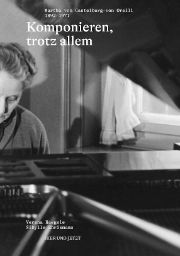Little-known Zurich composer
In their book, Verena Naegele and Sibylle Ehrismann trace the biography and artistic work of Martha von Castelberg.

Martha von Castelberg-von Orelli (1892-1971) must be described as a hitherto unknown Zurich composer who has only recently been rediscovered. The foundation named after her, established in 2004 and dedicated to publicizing her music, is making its first public appearance with this publication. It also holds out the prospect of a new edition of all her compositions.
Verena Naegele and Sibylle Ehrismann follow the "few traces" left behind by the artist, attempting on the one hand to trace her life and on the other to chronologically organize and appreciate her work.
Martha von Castelberg came from a branch of the von Orelli family that had turned to Catholicism and lived according to particularly strict religious principles. She grew up well protected in the Zurich diaspora in a wealthy banking family. She turned to music at an early age, played the violin and viola, taught herself to play the piano and studied harmony intensively, but did not go on to study music professionally. In 1920, she married the lawyer Victor von Castelberg and became the mother of two sons. She had been a self-taught composer since 1912. From 1939, she found her religious and musical home in the church of St. Martin in Fluntern, in the immediate vicinity of her home.
Martha von Castelberg composed sacred songs (mainly with organ accompaniment), four-part motets, some secular songs, a mass and a piano sonata, mostly for specific occasions or named performers in her circle of acquaintances, such as the tenor Peter Willi. Only a few songs and motets were printed or recordings of her compositions were released during her lifetime. After the death of her husband (1957) she became even quieter and after her death (1971) she was gradually forgotten.
The in-depth appreciation of her life and work in book form reveals much about the environment in which a woman in Switzerland at the time focused on composing mainly sacred music, but also includes the personal perspectives of the two authors in a noticeably undisguised way. At the same time, Sibylle Ehrismann's musical descriptions of the works lack additional musical examples that would have made it possible to penetrate beneath the analytical surface. Thus one eagerly awaits the (first) editions of (most of) the works in order to get to know the œuvre of an unusual composer in its entirety, which is now awakening to new life.
Verena Naegele and Sibylle Ehrismann: Martha von Castelberg-von Orelli 1892-1971: Composing, despite everything, 168 p., Fr. 34.00, Hier und Jetzt, Zurich 2021, ISBN 978-3-03919-539-8








